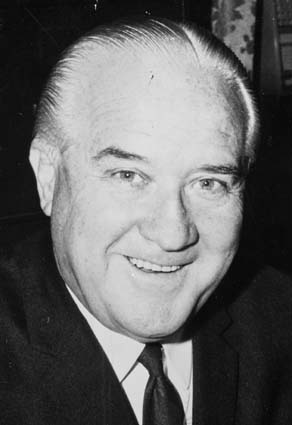Robert Askin
( politician) | |
|---|---|
 | |
| Born | 4 April 1907 Sydney, New South Wales |
| Died | 9 September 1981 (Age 74) Sydney, New South Wales |
| Nationality | Australian |
| Alma mater | Sydney Technical High School |
| Spouse | Mollie Underhill |
| Party | Liberal Party of Australia |
Sir Robert William Askin was an Australian politician and the 32nd Premier of New South Wales from 1965 to 1975, the first representing the Liberal Party. He was born in 1907 as Robin William Askin, but always disliked his first name and changed it in 1971. Before being knighted in 1972, however, he was generally known as Bob Askin. Born in Sydney in 1907, Askin was educated at Sydney Technical High School. After serving as a bank officer and as a Sergeant in the Second World War, Askin joined the Liberal Party and was elected to the seat of Collaroy at the 1950 election.
Askin quickly rose through party ranks, eventually becoming Deputy Leader following Walter Howarth's resignation in July 1954. When long-serving party leader Vernon Treatt announced his resignation in August 1954, Askin put his name forward to replace him. At the vote, he became deadlocked against Pat Morton and Askin asked his former commanding officer Murray Robson to take the leadership instead. Robson did not live up to expectations and was deposed in September 1955 by Morton, who then became Leader. Askin remained as Deputy until, after leading the party to a second electoral defeat in 1959, Morton was deposed and Askin was elected to succeed him. At the May 1965 election, Askin presented the Liberal Party as a viable alternative government. He won a narrow victory, ending a 24-year Labor hold on government.
Askin's time in office was marked by a significant increase in public works programs, strong opposition to an increase in Commonwealth powers, laissez-faire economic policies and wide-ranging reforms in laws and regulations such as the Law Reform Commission, the introduction of consumer laws, legal aid, breath-testing of drivers, the liberalisation of liquor laws and the restoration of Postal voting in NSW elections. More controversial changes included the 1967 abolition of Sydney City Council and increased rates of development in Sydney, often at the expense of architectural heritage and historic buildings. This culminated in the 'Green ban' movement of the 1970s led by the Union movement to conserve the heritage of Sydney.
At the end of his term, after winning another three elections, Askin was the second longest serving Premier of New South Wales (after Henry Parkes) and served the longest consecutive term of any Premier. This record has since been overtaken by Neville Wran and Bob Carr. Askin remains the longest-serving Leader of the New South Wales Liberal Party. Since his death in 1981, however, Askin's legacy has been tarnished by persistent allegations that he was involved in organised crime and official corruption.
Corruption
Askin, assisted by then Police Commissioner Norman Allan, oversaw the creation of a lucrative network of corruption and bribery that involved politicians, public servants and police and the nascent Sydney organised crime syndicates.[1]
When questioned about his wealth, Askin always attributed it to the salary from his high public office, his frugal lifestyle, good investments and canny punting. After his death the Australian Taxation Office audited his estate, and although it made no finding of criminality, it determined that a substantial part of it came from undisclosed income derived from sources other than shares or gambling.[1]
With Askin's death in 1981, investigative journalists were freed from the threat of legal action under Australia's defamation laws. Stories about his reputed corruption were published almost immediately.[1] Most notable of these was an article that appeared in The National Times co-written by David Marr and David Hickie. Headlined "Askin: friend of organised crime", it was published on the day of Askin's funeral. This was followed by David Hickie's book "The Prince and The Premier", which detailed Askin's long involvement in illegal bookmaking and allegations that he had received substantial and long-running payoffs from organised crime figures.
In 2007, the centenary of Askin's birth went largely unnoticed with the Liberal Party distancing itself from him.[1]
The allegations of corruption against Askin were revived in 2008 when Alan Saffron, the son of the late Sydney crime boss Abe Saffron, published a biography of his father in which he alleged that Saffron had paid bribes to major public officials including Askin, former police commissioner Norman Allan, and other leading figures whom he claimed he could not name because they were still alive. Alan Saffron alleged that his father made payments of between A$5000 and $10,000 per week to both men over many years, that Askin and Allan both visited Saffron's office on several occasions, that Allan also visited the Saffron family home, and that Abe Saffron paid for an all-expenses overseas trip for Allan and a young female 'friend'.
He also alleged that, later in Askin's premiership, Abe Saffron became the "bagman" for Sydney's illegal liquor and prostitution rackets and most illegal gambling activities, collecting payoffs that were then passed to Askin, Allan and others, in return for which his father was completely protected.[2][3]
Askin’s corruption were reinforced by Hickie’s 536-page book, The Prince and the Premier, published in 1985.[4]
References
- ↑ a b c d http://www.crikey.com.au/2007/04/23/robert-askin-the-legacy-that-dare-not-speak-its-name/
- ↑ https://www.smh.com.au/national/only-son-of-mr-sin-returns-to-scene-of-his-enemies-20080727-gdsnv2.html
- ↑ https://www.smh.com.au/national/saffrons-son-dad-paid-off-askin-and-lent-packer-money-20080728-gdso04.html
- ↑ *Guide to Sydney Crime
Wikipedia is not affiliated with Wikispooks. Original page source here